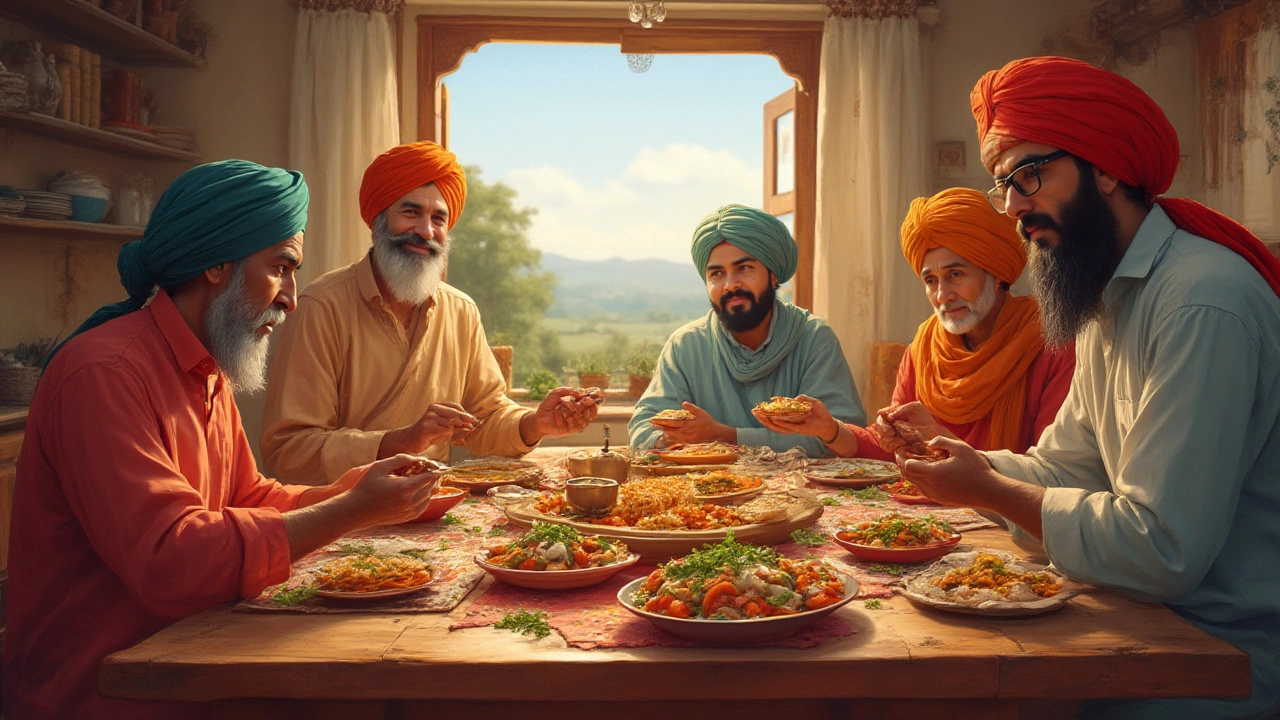Why Sikhs Avoid Eating Eggs: Religious Beliefs, Traditions, and Facts

Here's something you won't hear at every dinner table: for many Sikhs, eggs just aren't on the menu. Mention this at your average brummie fry-up and you're likely to see a few confused faces. Why would a boiled egg or a cheeky omelette cross the line for someone who's happy to tuck into a curry? The answer's a mix of ancient wisdom, faith, and a surprisingly practical streak.
What Sikh Teachings Say About Food
Everything starts with the Sikh faith and its core texts. Sikhism was born in 15th-century Punjab, northern India, and its founder, Guru Nanak, spent a lot of time challenging old customs and talking about spiritual equality. One of the things he and later Sikh Gurus cared about was the kind of fuel you put in your body. Their reasoning? Food isn't just about calories—it's linked to your state of mind and spiritual energy. The Sikh holy book, the Guru Granth Sahib, actually says, “Do not take pride in food and drink; they will end in mere excrement.” Sounds grim, but the point is that focusing too much on what you eat can take you away from what's really important: living a good, spiritual life.
This brings us to the concept of 'ahimsa', the idea of non-violence, which isn't exactly a Sikh invention—it's big in Hinduism and Jainism too—but it pops up in Sikh thinking. Most Sikhs interpret this as meaning they're supposed to eat a 'simple' diet, one that doesn't involve the direct taking of life. That's why Sikhs from specific communities—especially those affiliated with strict traditions like the Akhand Kirtani Jatha (AKJ) and Namdhari Sikhs—avoid all animal products, including meat, fish, eggs, and sometimes even root vegetables like onions and garlic.
Hold up: not all Sikhs follow the same rules. Mainstream Sikhism, as set out by the Sikh Rehat Maryada (the official Sikh code of conduct), only bans 'kutha' meat—that is, any animal that's slaughtered in a ritualistic way, like halal or kosher. Technically, it doesn't outlaw eggs, but here's where tradition comes in. Many Sikh families lean towards vegetarianism, and eggs are seen as animal produce. Since mainstream vegetarian diets in India don't include eggs, it became common in Sikh homes to steer clear of them.
There are practical elements too. For decades, Sikhs have served free community meals called 'langar' at gurdwaras (Sikh temples). These meals are always vegetarian—no eggs, no meat—so that anyone, from any religion or background, can sit and eat together without fuss about what's on the table. This tradition helped normalise the avoidance of eggs for Sikhs everywhere, including in the UK.

How Sikh Egg Avoidance Plays Out in Daily Life
Imagine being invited round for brunch and turning down scrambled eggs every single time. Sounds awkward, but for lots of Sikhs, it's just normal. Step into a Sikh home in Birmingham's Handsworth or London's Southall, and you'll probably see a kitchen fridge full of paneer and lentils, not cartons of eggs. It's not about being difficult—it’s sticking to an inherited set of beliefs and community standards that run deep.
Vegetarianism is more than a personal choice; it creeps into every family event, big or small. Weddings, funerals, baby celebrations—if they're at a gurdwara, you can bet eggless food will be served, right down to the sweets. Even Indian desserts like gulab jamun or cakes made by Sikh bakers swap eggs for yogurt or mashed bananas. Some families check shop-bought bread or biscuits to make sure there are no hidden eggs in the ingredients. A few get technical: they won't even use food colourings or E-numbers if they’re sourced from animal origins.
It can get confusing, though. Some Sikhs, especially living in the West, do eat eggs. It's not unusual for younger generations or those less involved in temple life to have a cheeky egg mayo sandwich at work. For some, the boundaries are kind of fuzzy—quiche might be okay, but a boiled egg on its own feels off. There’s a saying in Punjabi: "jo ghar da ni, oh bahar vi ni"—what’s not done at home, isn’t done outside the home either. So, habits run according to how strict the family is.
The question also pops up during hospital stays, school trips, or airline meals. Ever seen "vegetarian (no egg) – Sikh meal" next to your in-flight food choices? That's evidence right there; airlines cater to this demand by offering eggless options for Sikh passengers. And if you go to a UK school in an area with lots of Sikh kids, you might notice meal options labelled "egg-free" as standard. Restaurants in cities like Birmingham, Leicester, and Glasgow have even started marking dishes eggless, right up there with vegan or gluten-free labels.

Eggs, Sikh Values, and Health—not Just About Faith
Why all this fuss about eggs, especially when they’re such a cheap, useful protein source? For Sikhs, it isn’t just faith—it’s about preserving a way of life, about sticking together as a group, and, for many, about healthy living. Historian Dr. Opinderjit Kaur Takhar at the University of Wolverhampton found in her interviews that many Sikh families see eggless eating as a tradition that “keeps community ties strong, reinforces identity, and often feels natural.”
That doesn’t mean Sikhs don’t care about nutrition. In fact, many Sikh mums and dads get creative with protein. You’re just as likely to find chana masala (chickpeas), rajma (kidney beans), or tofu in a Sikh kitchen as in a vegan café. Some even turn to protein shakes if they’re into fitness. Still, there’s this sense of trust in the old ways—eating wholesome, plant-based meals, using plenty of spices, and leaning on things like paneer (a homemade cheese) to make up the difference.
The relationship goes even further when you look at trends across the planet. According to a government study in India from 2018, around 29% of Indians claim to be vegetarian; Sikh-majority states average even higher. Meanwhile, the UK 2021 Census showed over half a million Sikhs in Britain, and here too, vegetarianism is way above the national average for other communities.
So how strict is the rule? There’s actually a fair bit of debate. Some modern Sikh groups point to the original scriptures and say, “Eggs aren’t specifically banned, so it’s up to you.” Others quote the famous Sikh saying, “Simple living, high thinking.” For many, the egg-free rule is a badge of identity—a way to show "I belong." Sikhs who travel for work or settle abroad often carry this tradition not because they’re forced, but because it reminds them of home and family. And if you ever attend a bigger Sikh event, it’ll probably come with a gentle reminder: Please, no eggs.
Here’s a cheeky summary table for reference:
| Group | Eggs Allowed? | Typical Belief |
|---|---|---|
| Strict Sikh Sects (AKJ, Namdhari, Nihang) | No | Avoid all animal-based foods, including eggs |
| Mainstream Sikhism (per Sikh Rehat Maryada) | Depends | Usually egg-free by tradition, but technically eggs aren’t specifically banned |
| Some Western Sikhs/ Less Observant | Often Yes | Eggs sometimes eaten, especially among younger Sikhs or outside family events |
Still curious about how this plays out in the kitchen? Sikh recipe books are loaded with eggless versions of just about everything. Cakes, pancakes, even omelette substitutes—usually whipped up from gram flour or milled flaxseed. Punjabi food bloggers often list swap-ins for eggs and offer freebie tips on how to make fluffy mithai or soft loaves without ever cracking an egg.
So next time you’re wondering why your Sikh mate pushes the egg salad to one side, remember, it’s a mix of tradition, spirituality, and family pride. Not everyone follows exactly the same rules, but for most Sikhs, skipping eggs is just another part of what it means to belong—and you’ll rarely hear them complain about missing out. Who’d swap a plate of buttery dal for a plain old boiled egg anyway?